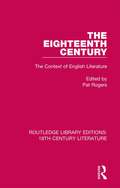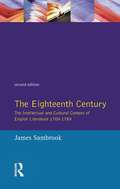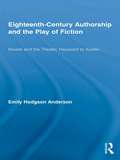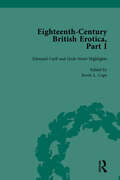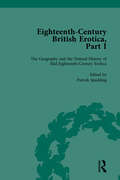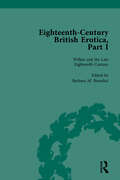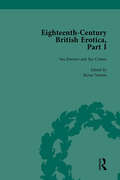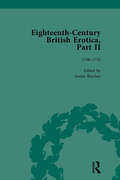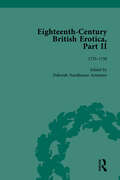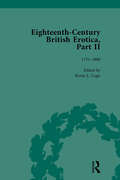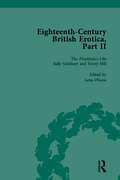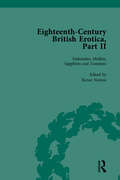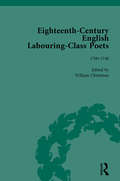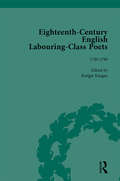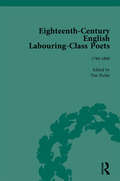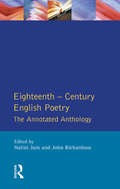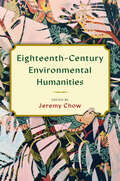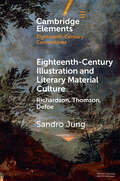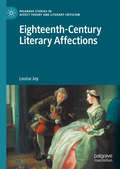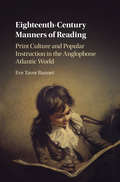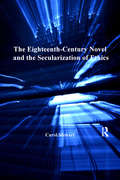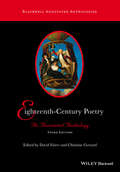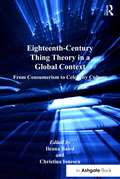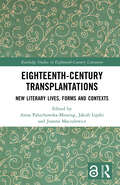- Table View
- List View
The Eighteenth Century: The Context of English Literature (Routledge Library Editions: 18th Century Literature)
by Pat RogersThe aim of this book, originally published in 1978, is to make the reading of literary classics such as Gulliver’s Travels, Robinson Crusoe, Tom Jones, The Beggar’s Opera and Tristram Shandy an even richer experience by giving them an intelligible place in history. The ‘context’ is seen not as a vague backcloth, but as a living fabric of ideas and events which animate Augustan literature. The authors cover the achievements of men like Hume, Walpole, Chippendale, Newton and Reynolds, who are often merely names to the literary student, and show how writers were affected by exciting developments in psychology, aesthetics, medicine and other fields. As a whole the book shows this period to have been an active, questing and complex era, whose literary masterpieces emanate from a rich and diverse culture.
The Eighteenth Century: The Intellectual and Cultural Context of English Literature 1700-1789 (Longman Literature In English Series)
by James SambrookThis is an impressive and lucid survey of eighteenth-century intellectual life, providing a real sense of the complexity of the age and of the cultural and intellectual climate in which imaginative literature flourished. It reflects on some of the dominant themes of the period, arguing against such labels as 'Augustan Age', 'Age of Enlightenment' and 'Age of Reason', which have been attached to the eighteenth-century by critics and historians.
Eighteenth-Century Authorship and the Play of Fiction: Novels and the Theater, Haywood to Austen (Routledge Studies in Eighteenth-Century Literature)
by Emily Hodgson AndersonThis study looks at developments in eighteenth-century drama that influenced the rise of the novel; it begins by asking why women writers of this period experimented so frequently with both novels and plays. Here, Eliza Haywood, Frances Burney, Elizabeth Inchbald, Maria Edgeworth, and Jane Austen explore theatrical frames--from the playhouse, to the social conventions of masquerade, to the fictional frame of the novel itself—that encourage audiences to dismiss what they contain as feigned. Yet such frames also, as a result, create a safe space for self-expression. These authors explore such payoffs both within their work—through descriptions of heroines who disguise themselves to express themselves—and through it. Reading the act of authorship as itself a form of performance, Anderson contextualizes the convention of fictionality that accompanied the development of the novel; she notes that as the novel, like the theater of the earlier eighteenth century, came to highlight its fabricated nature, authors could use it as a covert yet cathartic space. Fiction for these authors, like theatrical performance for the actor, thus functions as an act of both disclosure and disguise—or finally presents self-expression as the ability to oscillate between the two, in "the play of fiction."
Eighteenth-Century British Erotica, Part I vol 2
by Kevin L. CopeThis set reprints many of the 18th century's most notorious works, including eight from "The Fifteen Plagues of a Maiden-Head" (1707), that resulted in highly publicized court battles and in some cases helped shape laws on censorship that survived into modernity.
Eighteenth-Century British Erotica, Part I vol 3
by Patrick SpeddingThis set reprints many of the 18th century's most notorious works, including eight from "The Fifteen Plagues of a Maiden-Head" (1707), that resulted in highly publicized court battles and in some cases helped shape laws on censorship that survived into modernity.
Eighteenth-Century British Erotica, Part I vol 4
by Barbara M. BenedictThis set reprints many of the 18th century's most notorious works, including eight from "The Fifteen Plagues of a Maiden-Head" (1707), that resulted in highly publicized court battles and in some cases helped shape laws on censorship that survived into modernity.
Eighteenth-Century British Erotica, Part I vol 5
by Rictor NortonThis set reprints many of the 18th century's most notorious works, including eight from "The Fifteen Plagues of a Maiden-Head" (1707), that resulted in highly publicized court battles and in some cases helped shape laws on censorship that survived into modernity.
Eighteenth-Century British Erotica, Part II vol 1
by Janine BarchasComprises a variety of topics, from prostitution to flatulence, and paints a picture of the real and imaginative worlds inhabited by the people of eighteenth-century Britain. This title features a volume dedicated to homosexuality. It is intended for students of eighteenth century culture, queer theory, history of sexuality and book history.
Eighteenth-Century British Erotica, Part II vol 2
by Deborah Needleman ArmintorComprises a variety of topics, from prostitution to flatulence, and paints a picture of the real and imaginative worlds inhabited by the people of eighteenth-century Britain. This title features a volume dedicated to homosexuality. It is intended for students of eighteenth century culture, queer theory, history of sexuality and book history.
Eighteenth-Century British Erotica, Part II vol 3
by Kevin L. CopeComprises a variety of topics, from prostitution to flatulence, and paints a picture of the real and imaginative worlds inhabited by the people of eighteenth-century Britain. This title features a volume dedicated to homosexuality. It is intended for students of eighteenth century culture, queer theory, history of sexuality and book history.
Eighteenth-Century British Erotica, Part II vol 4
by Lena OlssonComprises a variety of topics, from prostitution to flatulence, and paints a picture of the real and imaginative worlds inhabited by the people of eighteenth-century Britain. This title features a volume dedicated to homosexuality. It is intended for students of eighteenth century culture, queer theory, history of sexuality and book history.
Eighteenth-Century British Erotica, Part II vol 5
by Rictor NortonComprises a variety of topics, from prostitution to flatulence, and paints a picture of the real and imaginative worlds inhabited by the people of eighteenth-century Britain. This title features a volume dedicated to homosexuality. It is intended for students of eighteenth century culture, queer theory, history of sexuality and book history.
Eighteenth-Century English
by Raymond HickeyThe eighteenth century was a key period in the development of the English language, in which the modern standard emerged and many dictionaries and grammars first appeared. This book is divided into thematic sections which deal with issues central to English in the eighteenth century. These include linguistic ideology and the grammatical tradition, the contribution of women to the writing of grammars, the interactions of writers at this time and how politeness was encoded in language, including that on a regional level. The contributions also discuss how language was seen and discussed in public and how grammarians, lexicographers, journalists, pamphleteers and publishers judged on-going change. The novel insights offered in this book extend our knowledge of the English language at the onset of the modern period.
Eighteenth-Century English Labouring-Class Poets, vol 1
by John Goodridge Simon Kövesi David Fairer Tim Burke William ChristmasPoets of labouring class origin were published in Britain in the 18th and 19th centuries. Some were popular and important in their day but few are available today. This is a collection of some of those poems from the 18th century.
Eighteenth-Century English Labouring-Class Poets, vol 2
by John Goodridge Simon Kövesi David Fairer Tim Burke William ChristmasPoets of labouring class origin were published in Britain in the 18th and 19th centuries. Some were popular and important in their day but few are available today. This is a collection of some of those poems from the 18th century.
Eighteenth-Century English Labouring-Class Poets, vol 3
by John Goodridge Simon Kövesi David Fairer Tim Burke William ChristmasPoets of labouring class origin were published in Britain in the 18th and 19th centuries. Some were popular and important in their day but few are available today. This is a collection of some of those poems from the 18th century.
Eighteenth Century English Poetry
by John Richardson Nalini JainThis anthology of 18th-century English poetry is extensively annotated for a new generation of readers. It combines the scope of a period anthology with the detailed annotations of an authoritative single-author edition. Selected poets include John Wilmot, Earl of Rochester, John Dryden, Jonathan Swift, Anne Finch, Countess of Winchilsea, Joseph Addison, Alexander Pope and William Cowper. The guiding principle of the annotation is one of thoroughness: the editors concentrate on works where the meanings have changed, on primary allusions and on relevant details of social and political history.
Eighteenth-Century Environmental Humanities (Transits: Literature, Thought & Culture, 1650-1850)
by Jeremy Chow Elliot Patsoura Annette Hulbert Adam Sweeting Shelby Johnson Mariah Crilley Claire Campbell Jason Payton Matt Duquès Ami Yoon Christopher Allan Black Kate ScarthThis groundbreaking new volume unites eighteenth-century studies and the environmental humanities, showcasing how these fields can vibrantly benefit one another. In eleven chapters that engage a variety of eighteenth-century texts, contributors explore timely themes and topics such as climate change, new materialisms, the blue humanities, indigeneity and decoloniality, and green utopianism. Additionally, each chapter reflects on pedagogical concerns, asking: How do we teach eighteenth-century environmental humanities? With particular attention to the voices of early-career scholars who bring cutting-edge perspectives, these essays highlight vital and innovative trends that can enrich both disciplines, making them essential for classroom use.
Eighteenth-Century Illustration and Literary Material Culture: Richardson, Thomson, Defoe (Elements in Eighteenth-Century Connections)
by Sandro JungThis Element studies eighteenth- and early nineteenth-century instances of transmediation, concentrating on how the same illustrations were adapted for new media and how they generated novel media constellations and meanings for these images. Focusing on the 'content' of the illustrations and its adaptation within the framework of a new medium, case studies examine the use across different media of illustrations (comprehending both the designs for book illustrations and furniture prints) of three eighteenth-century works: Defoe's Robinson Crusoe (1719), Thomson's The Seasons (1730) and Richardson's Pamela (1740). These case studies reveal how visually enhanced material culture not only makes present the literary work, including its characters and story-world. But they also demonstrate how, through processes of transmediation, changes are introduced to the illustration that affect comprehension of that work. This title is also available as Open Access on Cambridge Core.
Eighteenth-Century Literary Affections (Palgrave Studies in Affect Theory and Literary Criticism)
by Louise JoyThis book assesses the mediating role played by 'affections' in eighteenth-century contestations about reason and passion, questioning their availability and desirability outside textual form. It examines the formulation and idealization of this affective category in works by Isaac Watts, Lord Shaftesbury, Mary Hays, William Godwin, Helen Maria Williams, and William Wordsworth. Part I outlines how affections are invested with utopian potential in theology, moral philosophy, and criticism, re-imagining what it might mean to know emotion. Part II considers attempts of writers at the end of the period to draw affections into literature as a means of negotiating a middle way between realism and idealism, expressivism and didacticism, particularity and abstraction, subjectivity and objectivity, femininity and masculinity, radicalism and conservatism, and the foreign and the domestic.
Eighteenth-Century Manners of Reading: Print Culture and Popular Instruction in the Anglophone Atlantic World
by Eve Tavor BannetThe market for print steadily expanded throughout the eighteenth-century Atlantic world thanks to printers' efforts to ensure that ordinary people knew how to read and use printed matter. Reading is and was a collection of practices, performed in diverse, but always very specific ways. These practices were spread down the social hierarchy through printed guides. Eve Tavor Bannet explores guides to six manners or methods of reading, each with its own social, economic, commercial, intellectual and pedagogical functions, and each promoting a variety of fragmentary and discontinuous reading practices. The increasingly widespread production of periodicals, pamphlets, prefaces, conduct books, conversation-pieces and fictions, together with schoolbooks designed for adults and children, disseminated all that people of all ages and ranks might need or wish to know about reading, and prepared them for new jobs and roles both in Britain and America.
The Eighteenth-Century Novel and the Secularization of Ethics
by Carol StewartLinking the decline in Church authority in the late seventeenth and early eighteenth centuries with the increasing respectability of fiction, Carol Stewart provides a new perspective on the rise of the novel. The resulting readings of novels by authors such as Samuel Richardson, Sarah Fielding, Frances Sheridan, Charlotte Lennox, Tobias Smollett, Laurence Sterne, William Godwin, and Jane Austen trace the translation of ethical debate into secular and gendered terms. Stewart argues that the seventeenth-century debate about ethics that divided Latitudinarians and Calvinists found its way into novels of the eighteenth century. Her book explores the growing belief that novels could do the work of moral reform more effectively than the Anglican Church, with attention to related developments, including the promulgation of Anglican ethics in novels as a response to challenges to Anglican practice and authority. An increasingly legitimate genre, she argues, offered a forum both for investigating the situation of women and challenging patriarchal authority, and for challenging the dominant political ideology.
Eighteenth-Century Poetry: An Annotated Anthology (Blackwell Annotated Anthologies #35)
by David Fairer Christine GerrardCurrently the definitive text in the field and now available in an expanded third edition, Eighteenth-Century Poetry presents the rich diversity of English poetry from 1700-1800 in authoritative texts and with full scholarly annotation. Balanced to reflect current interests and “favorites” (including prominent poets like Finch, Swift, Pope, Montagu, Johnson, Gray, Burns, and Cowper) as well as less familiar material, offering a variety of voices and new directions for research and learning Includes 46 new poems with more texts by women poets and the inclusion of four additional poets (Mary Barber, Mehetabel Wright, Anna Seward, and Mary Robinson); poems reflecting new ecological approaches to 18th-century literature; and poems on the art of writing Accessible and user-friendly, with generous head notes, full foot-of-page annotations, an expanded thematic index, and a visually appealing text design
Eighteenth-Century Thing Theory in a Global Context: From Consumerism to Celebrity Culture
by Ileana Baird Christina IonescuExploring Enlightenment attitudes toward things and their relation to human subjects, this collection offers a geographically wide-ranging perspective on what the eighteenth century looked like beyond British or British-colonial borders. To highlight trends, fashions, and cultural imports of truly global significance, the contributors draw their case studies from Western Europe, Russia, Africa, Latin America, and Oceania. This survey underscores the multifarious ways in which new theoretical approaches, such as thing theory or material and visual culture studies, revise our understanding of the people and objects that inhabit the phenomenological spaces of the eighteenth century. Rather than focusing on a particular geographical area, or on the global as a juxtaposition of regions with a distinctive cultural footprint, this collection draws attention to the unforeseen relational maps drawn by things in their global peregrinations, celebrating the logic of serendipity that transforms the object into some-thing else when it is placed in a new locale.
Eighteenth-Century Transplantations: New Literary Lives, Forms and Contexts (Routledge Studies in Eighteenth-Century Literature)
by Jakub Lipski Joanna Maciulewicz Anna Paluchowska-MessingThis collection studies eighteenth-century British literature as enmeshed within a dynamic intercultural traffic, participating in the import and export of literary and cultural forms. Eighteenth-Century Transplantations places this transcultural circulation at the centre of attention and presents its products in a unique configuration. Literary transplants into the British context, out of it, and their transmedial afterlives are set together in order to showcase the mechanisms of such cultural commerce. The term 'transplantation', borrowed from medical and horticultural discourses and evocative of eighteenth-century experiments in gardening, is offered here as a useful kinetic model to conceptualize the diverse practices involved in relocating a literary text into a new cultural environment.
